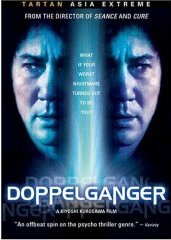
The oldest form of storytelling known to humankind, found in the earliest myths of any culture, horror stories are often coated in the universal fears and symbols, themes and motifs, of the past. This is particularly true of supernatural cinema, whose roots stem directly to the shadowy pool of our species' dawn. Vampires, specters, wraiths, demons -- each of these common cinematic subjects are indebted to an ancient cultural belief. Modern horror simply puts new masks on ancient anxieties, reinvigorating symbols of terror by placing them in a contemporary context. Doppelganger is an adroit example of folklore re-translated, preserving its archetypal power while employing the hidden language of myth to mirror modern fears.
Beginning its narrative race with a plot steeped in enigmatic twists, horrific set-pieces, and razor-sharp complexity, Doppelganger looses something of its narrative acrobatics by the end of the film, yet saves itself from failure by its intense characterization, all of which are focused on solving the problems evoked in the terse first half. A Faustus-like scientist on the verge of greatness, Michio Hayasaki (Kôji Yakusho) is striving to create a machine that allows the disabled to move through sheer power of will. When the project is temporarily halted, he meets his doppelganger. This carbon copy is the complete opposite of his rather isolated, quiet personality, doing things that both titillate and horrify him. While at first this mirror image disturbs him, he eventually warms up to the freedom that he vicariously enjoys. When his double invades the intimate areas of his family and love life, he rethinks his position. Forced into action, he is aided by Yuka (Hiromi Nagasaku), a woman whose brother 's death was caused by Michio's doppelganger.
Honoring the sacredness of folklore even as it defies it, Doppelganger is a satisfying merging of myth and madness, combining the timeless threats of the supernatural with terrors of the mind. Fragmented psyches are as dangerous herein as symbols of supernatural legend. A term for a body-double (either a demon or spirit) whose appearance signifies doom, the Doppelganger is of Germanic origin. Not as well known as either the vampire or werewolf, nor as universal as the ghost, this malevolent entity is just as primal, connected to both our cultural and personal fear of loosing ourselves -- our identities and the behaviors/thoughts that clarify us. Here the figure is especially complex, employed by the director as both a supernatural figure (with all the mythic reverberations that such implies) and a representative embodiment of the main character's fear or/desire for freedom. The philosophically rich screenplay suggests the danger inherent in unfettered freedom. On a simpler surface layer, the movie is evocatively lit, nightmarish in its intensity, and attaining the remembrance of dream in its emotional vacuum. A scathingly modern take on ancient legend, Doppelganger combines the split personality symbolism of Jeckyll and Hyde with the moral overtones of Dorian Gray. The result is a daring, profoundly disturbing drama rich in its moral warnings and relentless in its suspense.
Not as technologically proficient as other Tartan Asia Extreme releases, Doppelganger is a less efficient presentation than what we have come to expect from Asia Extreme in terms of visual presentation. Colors are a bit soft, and the picture a bit dull, lacking the dark beauty of their standard releases. Despite this complaint, the film is certainly viewable, demanding notice for its approach to traditional genre content. The sound transfer is admirable, clean and concise in both Dolby 5.1 surround sound and DTS. Also included are English and Spanish subtitles. If the presentation suffers, the extras are sound. Featuring a theatrical trailer for the title film, TV Spots, and trailers for other Asia Extreme titles, the supplements also include a significant examination of the film's conception and production in a "Making Of Featurette that combines Asian style PR with technical details An interview with director Kiyoshi Kurosawa follows, where he discusses his choice of tone and pacing, among other filmmaking penchants.
Review by William P. Simmons
| Released by Tartan Asia Extreme |
| Region 1 NTSC |
| Not Rated |
| Extras : see main review |